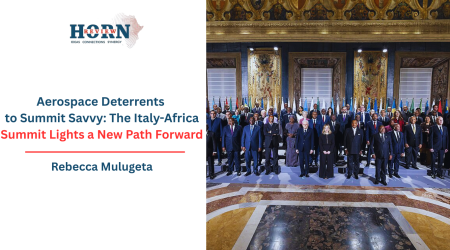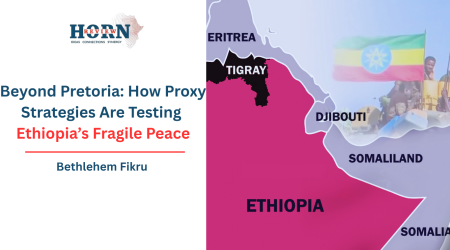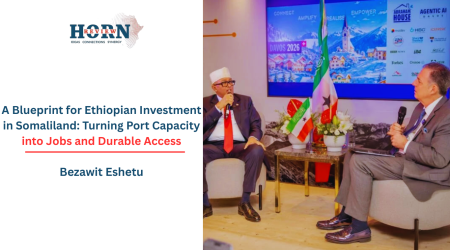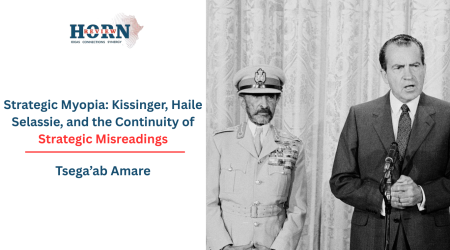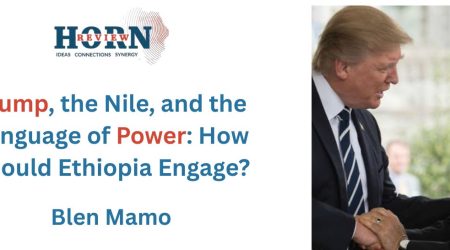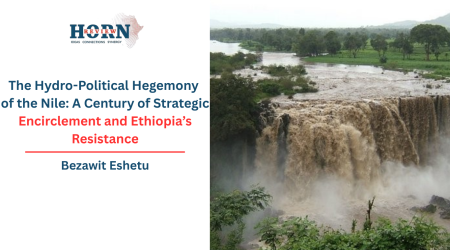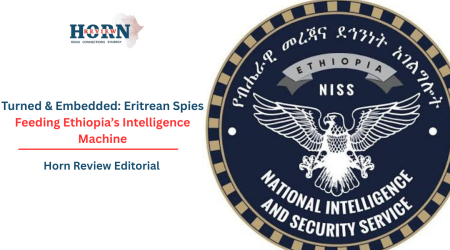
21
Jul
The Contemporary Foreign Policy of Ethiopia: An Outsider Perspective
Horn Review recently hosted H.E. Dr. Abdi Zenebe, Deputy Director of the Institute for Foreign Affairs (IFA), for a lecture on the relevance of transitiology in the context of Ethiopian politics and foreign policy. In his presentation, Dr. Abdi explored the political reform process initiated under Prime Minister Abiy Ahmed, emphasizing how the administration’s guiding philosophy of Medemer (synergy) seeks to transition the state away from entrenched patterns of cultural authoritarianism toward a more democratic and participatory governance model.
This transition was contextualized within broader regional patterns of political transformation across the Horn of Africa and beyond. Dr. Abdi presented Medemer as not only a domestic reform initiative but also as a vision for foreign policy—one that aspires to extend cooperation and mutual development under the “Horn First” principle. This approach, ambitious in its scope, sought to forge closer relations with neighboring states—particularly Eritrea, Djibouti, and Somalia. Notably, this regional rapprochement contributed to Prime Minister Abiy’s receipt of the Nobel Peace Prize in 2019. However, the positive momentum of this approach has since encountered significant setbacks, with diplomatic relations with key neighbors currently under strain.
In contrast to Ethiopia’s ideal of regional cooperation, dominant trends in global foreign policy continue to be shaped by realist assumptions—namely, that international politics are characterized by competition, conflict, and the pursuit of national interest through power maximization. States are often perceived as rational actors operating in an anarchic global system where survival, sovereignty, and influence depend largely on military strength and strategic alliances. This realist worldview has remained influential long after the Cold War, shaping the foreign policy of many regional and global actors.
Indeed, the Horn of Africa itself has experienced mini–Cold War dynamics, with Eritrea and Ethiopia, for instance, supporting rival opposition groups and undermining each other for much of the past three decades. Similar patterns have characterized Ethiopia–Somalia relations. Against this backdrop, Ethiopia’s recent foreign policy—framed in idealistic terms that emphasize shared identities and mutual prosperity—can appear as a notable departure from conventional strategic thinking.
That said, Ethiopia’s cooperative stance could offer long-term benefits. Its vision of a win-win model of regional relations stands in contrast to zero-sum power politics. However, the realization of this model remains contingent on overcoming deep-rooted skepticism—both within Ethiopia’s political elite and in neighboring countries—where realist strategies continue to dominate. Many senior officials, shaped by historical conflicts and strategic distrust, remain wary of cooperative approaches, especially when neighboring governments are perceived to pursue policies that challenge Ethiopia’s sovereignty or national interests.
This skepticism is not without basis. Over the past few years, political rhetoric and diplomatic posturing from countries such as Egypt, Eritrea, and Djibouti have occasionally framed Ethiopia as a strategic adversary. While these tensions persist at the leadership level, Ethiopia’s foreign policy vision seems to prioritize long-term people-to-people relationships, with the hope that generational shifts in leadership across the region may open the door for more constructive engagement in the future.
If Ethiopia maintains a consistent and transparent policy grounded in cooperation and peaceful relations, it may gradually foster mutual trust within the region. Over time, such a policy stance could shape regional discourse and gain wider acceptance among both populations and future leaders.
Civil society organizations can play a valuable role in supporting and advancing this vision. Think tanks, research institutions, and independent media—both regional and international—may contribute by facilitating dialogue, offering policy recommendations, and encouraging mutual understanding among the peoples of the Horn. Collaboration between these actors and government institutions could help create a broader ecosystem for peacebuilding and cooperative development.
Regional platforms such as the Intergovernmental Authority on Development (IGAD) also present opportunities for advancing this diplomatic approach. Ethiopia could benefit from exploring stronger bilateral cooperative mechanisms with neighboring states, such as Djibouti and Kenya, particularly in areas of trade, infrastructure, and economic integration.
In the long run, sustainable peace and economic growth across the Horn of Africa may require bold institutional innovations. One proposal worth further exploration is the formation of a Horn of Africa Security Council—a regional body focused exclusively on conflict prevention and resolution. While the African Union Peace and Security Council (AUPSC) plays an important role, its capacity to respond effectively to local crises remains limited. A dedicated Horn Security Council with appropriate mandates, resources, and inclusive representation could help safeguard regional stability. Thought could also be given to establishing a regional peacekeeping force, tasked with securing key areas such as the Red Sea and ensuring the protection of vital trade routes.
Dr. Abdi also emphasized the internal dimension of Ethiopia’s foreign policy reform. He described a three-stage transition process: liberalization, democratization, and consolidation. Although framed as a gradual evolution, the changes thus far have often been implemented with a level of speed and intensity that resembles revolutionary reform. According to Dr. Abdi, Ethiopia is now in the democratization phase. However, this trajectory faces significant horizontal challenges—including internal unrest and unresolved conflicts.
Indeed, the domestic situation remains a crucial variable. Prolonged internal conflicts undermine both economic recovery and international credibility. Without resolving these internal challenges—particularly through inclusive dialogue and political reconciliation—Ethiopia’s broader reform agenda risks losing momentum. In this regard, internal peace is not only a national priority but also a prerequisite for effective regional leadership.
If Ethiopia succeeds in its reform efforts, it may offer a compelling model for other countries in the region. But for such influence to materialize, the country must continue to reconcile its internal contradictions while maintaining a coherent and credible foreign policy. As the region navigates a volatile international landscape, Ethiopia’s experience could help inform a more collaborative and sustainable approach to peace and development in the Horn of Africa.
By Markos Haile Feseha, Researcher,Horn Review

